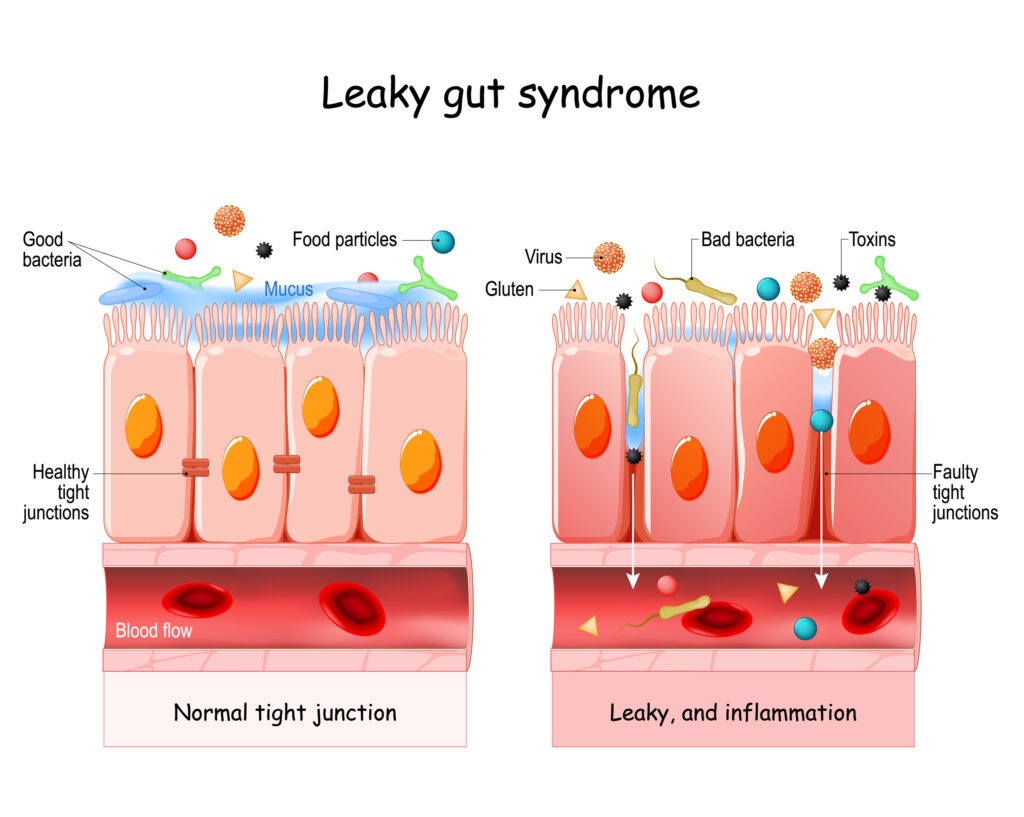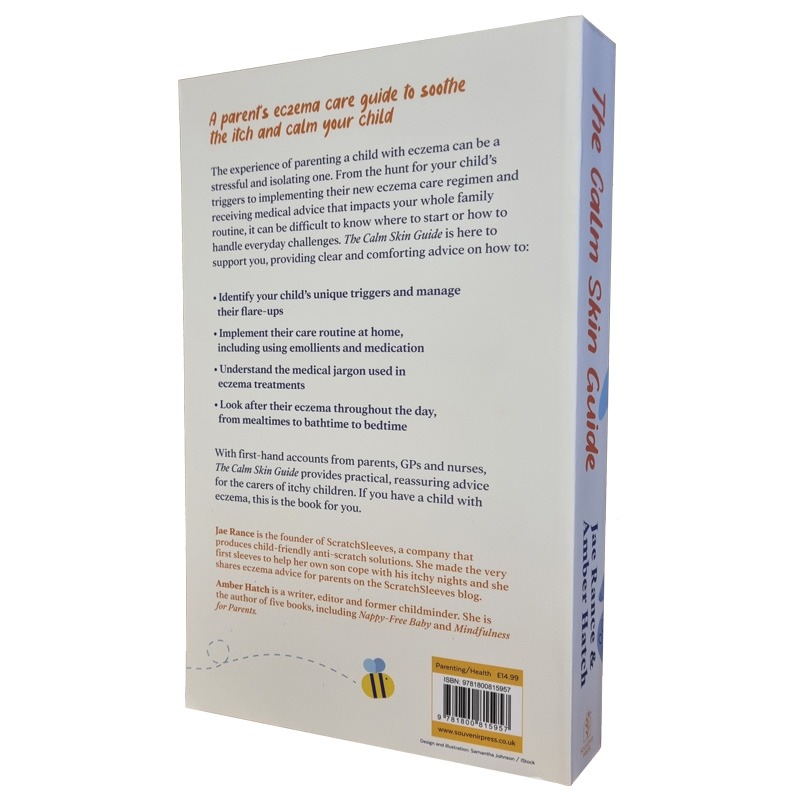Leaky gut syndrome – Is it connected to eczema?



Leaky gut syndrome is one of those conditions that is often suggested as a possible cause for eczema. But what is a leaky gut and is there any science behind claims that it can cause eczema? We look at the research into the link between gut and skin health and what practical steps you can take to manage your child’s eczema with this knowledge.
What is “Leaky Gut Syndrome”?
The skin is the human body’s largest organ and is made up of a complex network of various cells, proteins, ceramides, and lipids. The most important component of these is the skin barrier which is formed of three major layers – the epidermis, dermis and subcutis.
The skin forms an effective barrier between the internal body and the environment. It works both ways, protecting from external dangers, like chemicals and bacteria, and retaining water. When required, it also enable the expulsion of toxins through sweating.
If the skin barrier is compromised and not working as it should, skin is far more vulnerable to damage and dehydration. This causes dull, dry and itchy skin – symptoms eczema families know all too well.
The skin surrounds the mouth and then continues inside the body, eventually forming the lining to the digestive tract. Given the physical connection, it has been widely supposed that any impairment to the skin barrier could also continue internally. The gut is semi-permeable just like the skin. The mucous lining of the intestines absorbs water and nutrients from what we eat and passes it into the bloodstream. Some people, however, may have increased permeability in the gut which means that more than water and nutrients can get through. This hypothetical condition has been named “leaky gut syndrome.”
The atopic triad
As a parent or carer of a child with eczema, you are probably already familiar with the so-called atopic triad. This refers to eczema, allergies (either seasonal like hayfever, or to other elements like house dust mites or certain foods) and asthma. The three often go hand in hand hence the name triad. It is worth noting that not all children who suffer with eczema will experience allergies or asthma.
As we have mentioned, food allergies are not uncommon in children with eczema. Specific foods, such as cow’s milk, can cause flare ups and as such your child is likely to undergo allergy testing as part of their care plan. Building on this fact, scientists in recent years have done extensive research on the links between eczema and overall gut health. This is done by examining the gut microbiome.
What is the gut microbiome?
The gut microbiome is a term used to describe the huge variety of micro organisms which live naturally in the gastrointestinal tract – and mainly in the intestines. More than 1000 types of bacteria live here and they play an important role in regulating both the immune system and skin health.
How is this linked to childhood eczema?
Studies have shown that children with eczema may have a more limited range of gut bacteria than children who don’t. It is generally agreed that the more diverse the gut bacteria the better for overall health. It is thought that specific types of gut microbes are associated with eczema.
Furthermore, according to a study in the Journal of Investigative Dermatology – children suffering from eczema have a greater incidence of leaky gut syndrome in comparion to children who do not have eczema.
Leaky gut allows for increased levels of toxins in the bloodstream. The body is designed to eliminate these toxins and, as mentioned previously, one of the skin’s purposes is to act as a two way barrier allowing out toxins as well as keeping them from getting in. It follows therefore that in theory increased toxins being expelled could cause an eczema flare.
What are the symptoms or red flags of leaky gut?
As all individuals are different, these may not be the same for everyone but a combination of one or more of these in your eczema child is probably worth further investigation.
- Stomach pains after eating. This is caused by undigested particles which have entered the bloodstream through the hyper permeable gut and entered the bloodstream.
- Severe constipation, diarrhea, bloating or gas.
- Nutrional deficiences due to compromised absorption into the bloodstream.
- A weak immune system.
- Headaches and excessive tiredness (most likely grumpiness in small children!)
- Skin rashes and inflammation. In addition to eczema look out for rosacea and spots.
- Joint pain.
- Hyperactivity and mood swings (this one is harder to define given it is pretty much a defining feature of any toddler!)
- Food allergies.
Testing for leaky gut syndrome in children
There is no official diagnoses for Leaky Gut Syndrome there are certain tests that can be done to indirectly diagnose it.
-
Lactulose and Mannitol Test for Leaky Gut
Analysing a urine sample to check the processing of lactulose and mannitol. These are two sugars which the patient consumes so that the ratios of lactulose to mannitol can be measured. These ratios can be a marker of leaky gut. -
Organic acid Mineral and Vitamin Deficiency Test
This helps identify nutritional deficiencies. Commonly referred to by the acronym ‘OAT’, levels of organic compounds in urine are analysed to flag up nutritional deficiencies. -
Blood Test for Zonulin
Zonulin affects the porosity of the gut. Increased levels of zonulin causes loosening and increased gut permeability. A simple blood test can check for this. -
Stool test
A stool test is done to analyse the condition of the gut. They are examining and searching for both good and bad bacteria, viruses, bacteriophages, fungi, yeast, parasites and any other things that may be contributing to intestinal permeability. -
Food Tolerance Test
Although it may not help in the direct diagnosis of the leaky gut, once leaky gut is suspected it is important for testing in order to plan diet and know what to avoid. In children this can be done by blood tests or skin prick tests. Some may prefer an elimination diet, where certain foods are gradually introduced and reactions are closely monitored.
What should I do if my child has Leaky Gut Syndrome?
Your medical practioner will be able to advise you on this as they know your child’s medical history. This Australian article offers practical advice. As well as food allergy testing they recommend the following:
“Diet is the cornerstone in helping to heal and repair the gut. The first thing I’d suggest is to put your child on a low-inflammatory diet by removing gluten, dairy, additives, preservatives and processed sugar for three months. During this time, it is important to try and encourage them to eat fermented foods, as well as taking pre- and pro-biotics. These contain living enzymes and encourage a healthy environment in the digestive tract. A great treat for kids is coconut yogurt made with probiotics.”
Mullen Health
Further useful reading can be found here – an article aimed at parents of autistic children rather than eczema sufferers, but nonetheless practical and interesting: Using the 4 R’s to Heal Your Child’s Leaky Gut – Your Autism Game Plan
Probiotics
Probiotics can support the gut lining to reduce permeability and restrict unwanted particles from passing into the bloodstream. This lowers inflammation and immune responses. They can also prevent bad bacteria and yeast from taking over the gut.
Probiotics can help break down food and turn it into vital nutrients by producing exoenzymes which tackle complex proteins and improve the absorption of amino acids. They have been shown to help improve the gut barrier by increasing the secretion of the mucus that lines the gut. You can read more about probiotics and eczema here.
Vitamin D
You may be surprised to learn that an estimated 50% of the world’s population has a vitamin D deficiency. Vitamin D is beneficial for both the good gut bacteria and reducing the permeability of the gut. It also supports the immune system. Research has shown that individuals with higher levels of active vitamin D are more likely to have 12 types of bacteria in their gut which produce butyrate – a fatty acid which keeps the gut’s lining healthy.
Government advice is to supplement with a multivitamin up to the age of five as well as maintaining a healthy and varied diet (which we know from experience can be easier said than done with the little people!) It is especially important for mums of babies who are breastfed to get enough Vitamin D as formula has it added in.
This article is worth reading: Vitamin D – NHS (www.nhs.uk)
In conclusion
Leaky Gut Syndrome is a tricky one as there is no specific diagnosis for it and a certain amount of trial and error is called for. However, it can be managed effectively in consultation with your child’s healthcare provider. My own nephew was suspected of Leaky Gut Syndrome from a young age and manages it effectively with a careful diet. He says “I know that there are certain things I can’t eat or I will suffer the consequences! Now I am old enough to manage my own diet it doesn’t affect my life negatively in the slightest.”
Further reading:
- Are Leaky Gut and Eczema Connected? | AtopicDermatitis.net
- 3 Tests & 10 Symptoms Of Leaky Gut + My Favorite | Goodbye Leaky Gut
- Can Leaky Gut Cause Eczema? – Annex Naturopathic Clinic (citynaturopathic.ca)
- New study shows how to heal your gut with vitamin D (chiroeco.com)
As well as sharing our experience of bringing up an eczema child (and favourite allergy-friendly recipes), ScratchSleeves also manufacture and sell our unique stay-on scratch mitts and PJs for itchy babies, toddlers and children. We now stock sizes from 0-adult in a range of colours. Visit our webshop for more information.
The Calm Skin Guide
Love our blog? It's also available in book format with:
- First hand accounts from parents & medical professionals
- Easy navigation
- Comprehensive index
- Additional material
Signed copies available at no extra cost
Written by:
Reviewed by:
Interesting article? Don't keep it to yourself...
Read next...
You may also find helpful...
Quick buy


Multi Buy Discount

Spend between £30 - £60 and save 5%
Spend between £60 - £120 and save 10%
Spend over £120 and save 15%
Discount automatically applied at checkout
No Quibbles Guarantee

ScratchSleeves abide by a no quibbles guarantee.
Free UK Postage

Free packing and postage on all UK orders. For overseas orders to Europe postage is from £3.50, to USA is £6.50 and to the rest of the world, from £3.75.








